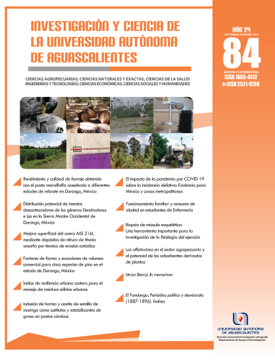Mejora superficial del acero AISI 316L mediante depósitos de nitruro de titanio amorfo por técnica de erosión catódica
DOI:
https://doi.org/10.33064/iycuaa2021843133Palabras clave:
Acero 316L; erosión catódica; recubrimiento; ingeniería de superficie; dureza; resistividad eléctrica.Resumen
El acero inoxidable AISI 316L por sus características de resistencia a la corrosión en ambientes alcalinos, estabilidad mecánica a altas temperaturas es atractivo para diversas industrias como aeronáutica, automotriz, petroquímica, alimenticia e incluso instrumentos quirúrgicos. No obstante, cuando se encuentra en ambientes ácidos ricos en cloruros no cuenta con la suficiente protección contra la corrosión, lo que resulta perjudicial para sus propiedades mecánicas. Por tanto, se han empleado recubrimientos de nitruro de titanio amorfo con bajos espesores capaces de mejorar sus características superficiales, como el incremento de dureza y resistividad eléctrica de la superficie. El método de síntesis de erosión catódica al ser una técnica física asegura una gran homogeneidad, alta adherencia al sustrato y control del espesor. Por consiguiente, se alcanzó una dureza con valores de 7.17 GPa, con una resistividad de 2.20E+09 ohm-cuadro para T4, con un espesor máximo de ~1.7 µm.
Descargas
Citas
• Bait, L., Azzouz, L., Madaoui, N., & Saoula, N. (2017). Influence of substrate bias voltage on the properties of TiO2 deposited by radio-frequency magnetron sputtering on 304L for biomaterials applications. Applied Surface Science, 395, 72-77. doi: 10.1016/j.apsusc.2016.07.101
• Czettl, C., Thurner, J., & Schleinkofer, U. (2018). Knowledge based coating design of CVD TiN-TiBN-TiB2 architecture. International Journal of Refractory Metals and Hard Materials, 71, 330-334. doi: 10.1016/j.ijrmhm.2017.11.040
• Dhanaraj, R., Mohamed, S. B., Kamruddin, M., Kaviyarasu, K., & Manojkumar, P. A. (2021). Structural properties of TiN thin films prepared by RF reactive magnetron sputtering. Materials Today: Proceedings, 36(2), 146-149. doi: 10.1016/j.matpr.2020.02.668
• Domínguez-Crespo, M. A., Torres-Huerta, A. M., Rodríguez, E., González-Hernández, A., Brachetti-Sibaja, S. B., Dorantes-Rosales, H. J., & López-Oyama, A. B. (2018). Effect of deposition parameters on structural, mechanical and electrochemical properties in Ti/TiN thin films on AISI 316L substrates produced by r. f. magnetron sputtering. Journal of Alloys and Compounds, 746, 688-698. doi: 10.1016/j.jallcom.2018.02.319
• García-González, L., López-Huerta, F., Araujo-Pérez, D. J., Zamora-Peredo, L., Flores-Ramírez, N., Vásquez García, S. R., …Hernández-Torres, J. (2018). Effect of the temperature variation on the hardness and microstructure of TiSiNO coatings obtained by sputtering. IOP Conference Series: Materials Science and Engineering, 446. doi: 10.1088/1757-899X/446/1/012001
• Hernández Montiel, S., Hernández Torres, J., Araujo Pérez, D. J., Orozco Cruz, R., Morales Hernández, J., Zamora Peredo, L., & García González, L. (2021). Study of the variation of the voltage and time of the process in the anodizing of TiO2 with HCl. ECS Transactions, 101(1), 199-211. doi: 10.1149/10101.0199ecst
• Kant, R., Mittal, R., Kumar, C., Rana, B. S., Kumar, M., & Kumar, R. (2018). Fabrication and characterization of weldments AISI 304 and AISI 316 used in industrial applications. Materials Today: Proceedings, 5(9), 18475-18481. doi: 10.1016/j.matpr.2018.06.189
• Kearney, B. T., Jugdersuren, B., Culbertson, J. C., Desario, P. A., & Liu, X. (2018). Substrate and annealing temperature dependent electrical resistivity of sputtered titanium nitride thin films. Thin Solid Films, 661, 78-83. doi: 10.1016/j.tsf.2018.07.001
• Kumar, P., Bansal, D., Anuroop, Mehta, K., Kumar, A., Rangra, K., & Boolchandani, D. (2019). Optimization of titanium nitride film for high power RF MEMS applications. Journal of Electronic Materials, 48, 6431-6436. doi: 10.1007/s11664-019-07435-9
• Maytorena-Sánchez, A., Hernández-Torres, J., López-Huerta, F., Hernández-Campos, M. A., Zamora-Peredo, L., Pacio-Castillo, M., …García-González, L. (2021). Analysis of the hardness and tribological properties of grade 2 titanium using the thermal oxidation process at different temperatures. Materials Letters, 282, 2020-2022. doi: 10.1016/j.matlet.2020.128679
• Santaella-González, J. B., Garcia-Gonzalez, L., Araujo Pérez, D. J., Galvan-Martinez, R., Hernández-Torres, J., Cruz-Jáuregui, M. P., & Morales-Hernández, J. (2019). Microstructural analysis of W-doped TiO2 thin films deposited by sputtering. ECS Transactions, 94(1), 211–217. doi: 10.1149/09401.0211ecst
• Shukla, K., Rane, R., Alphonsa, J., Maity, P., & Mukherjee, S. (2017). Structural, mechanical and corrosion resistance properties of Ti/TiN bilayers deposited by magnetron sputtering on AISI 316L. Surface and Coatings Technology, 324, 167-174. doi: 10.1016/j.surfcoat.2017.05.075
• Uddin, G. M., Jawad, M., Ghufran, M., Saleem, M. W., Raza, M. A., Rehman, Z. U., … Waseem, B. (2019). Experimental investigation of tribo-mechanical and chemical properties of TiN PVD coating on titanium substrate for biomedical implants manufacturing. The International Journal of Advanced Manufacturing Technology, 102(5–8), 1391-1404. doi: 10.1007/s00170-018-03244-2
• Yan, Z., Jiang, D., Gao, X., Hu, M., Wang, D., Fu, Y., … Weng, L. (2018). Friction and wear behavior of TiN films against ceramic and steel balls. Tribology International, 124, 61-69. doi: 10.1016/j.triboint.2018.03.031
• Yazıcı, M., Kovacı, H., Yetim, A. F., & Çelik, A. (2018). Structural, mechanical and tribological properties of Ti and TiN coatings on 316L stainless steel. Ceramics International, 44(12), 14195-14201. doi: 10.1016/j.ceramint.2018.05.022
Descargas
Publicado
Cómo citar
Licencia
Derechos de autor 2021 Jorge Bertín Santaella-González, Ricardo Orozco-Cruz, Julián Hernández-Torres , Leandro García-González

Esta obra está bajo una licencia internacional Creative Commons Atribución-NoComercial-CompartirIgual 4.0.
Las obras publicadas en versión electrónica de la revista están bajo la licencia Creative Commons Atribución-NoComercial-CompartirIgual 4.0 Internacional (CC BY-NC-SA 4.0)









